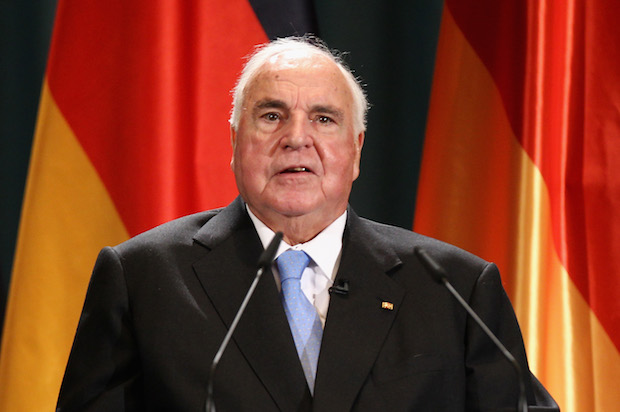The British public never really warmed to Helmut Kohl. In Britain, he was always seen as too bossy, too bumptious, too… well, too Teutonic. Margaret Thatcher thought so too. ‘My God, that man is SO German,’ she told Charles Powell, after Kohl’s attempt to woo her with his favourite dish, stuffed pig’s stomach, fell horribly flat.
Even the Germans were often ambivalent about their longest serving Chancellor since Bismarck. East Germans ended up disillusioned when Kohl’s lavish promises of ‘blooming landscapes’ failed to materialise. West Germans ended up disillusioned when they had to foot the bill. Yet history will judge him kindly, in Germany and Britain. For all his faults, he was a political colossus, and his death, aged 87, marks the passing of an age.
More sophisticated Germans regarded Kohl as ponderous and provincial. He was a Rhinelander, a region whose closest English equivalent is probably the West Country (imagine a British prime minister with a thick Dorset or Somerset accent). ‘Kohl’ is German for cabbage – hardly a heroic moniker in any language. Yet his enemies learnt, too late, to underestimate him at their peril. Kohl was a plodder but he had the common touch, and when the great challenge of his life arrived, he moved with astounding speed.
German Reunification was Kohl’s crowning glory. That he managed this momentous feat without bloodshed is a triumph we should be proud to share. While other politicians advised caution, Kohl understood the need for action. He realised a door had opened which would soon close and never open again. A slower process would have been more prudent, and kinder economically, but that presupposed the world would stay the same. Kohl knew better – and when the chance came, he seized it. He mismanaged the economics, but he got the politics spot on. His decisiveness brought East Germany into the free world, and made the world far safer. This was Nato’s greatest victory, the ultimate vindication of the Bundesrepublik that Britain and America had created, and supported since the Second World War.
Like Churchill in 1940, everything in Kohl’s life felt like a preparation for this one moment. Born in 1930 in Ludwigshafen, close to the French border, he was the last German Chancellor to serve in the Second World War. His beloved elder brother, Walter, died fighting for the Wehrmacht on the Eastern Front. ‘Look after our mother,’ Walter told Helmut, before he left. ‘I won’t be coming back.’ This experience shaped his character, and informed his attitude to foreign policy. Like so many Germans he was an Anglophile, but above all he was a Francophile. His entire career was built on the determination that France and Germany should never go to war again.
Twenty seven years since reunification, what is Kohl’s legacy? As an architect of Maastricht, he bears some of the blame for Europe’s current ills, but by any reasonable measure his reunified Germany has been a remarkable success. Eastern Germany is still significantly poorer than Western Germany, but it’s immeasurably richer than its Eastern neighbours (cross the border at Zittau, an East German town that abuts both Poland and the Czech Republic, and see the difference for yourself). When I first went East, in 1991, East Germany was an economic wasteland of empty shops and derelict factories. Now East German cities like Leipzig and Dresden are booming, and though the smaller towns are still struggling, the contrast between Eastern and Western Germany feels less stark than the contrast between Northern and Southern England. For a place where private ownership and private enterprise were virtually forbidden for half a century, that’s no mean feat.
So why has Britain been so reluctant to celebrate Kohl’s great achievement? Why was Mrs Thatcher so begrudging, even when Kohl and Mitterand held hands at Verdun? Didn’t she realise that German reunification was a triumph for Britain too? West Germany’s peaceful conquest of East Germany was a triumph of capitalism over communism, a victory for free enterprise and free thinking over state ownership and mind control.
Britain was worried a reunited Germany would become too powerful. In fact, the Herculean task of rebuilding Eastern Germany has preoccupied the Germans for the last three decades, and will continue to preoccupy them for decades to come. Without Helmut Kohl, a great Christian Democrat, we might still have an East German statelet on our doorstep, open to Russian influence, rather than a loyal Nato ally. And for Britain, and for Europe, that’s a blessing indeed.






Comments